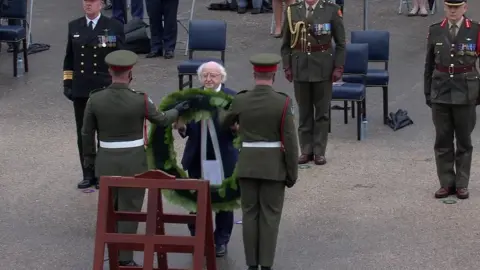Dublin ceremony marks Irish war of independence truce
 RTE
RTEThe 100th anniversary of the truce in the Irish War of Independence has been marked at a ceremony in Dublin.
As part of an event to mark the national day of commemoration in the Republic of Ireland, those who died in the 1919-1921 war were remembered.
More than 2,000 people were killed in the conflict between British forces and the Irish Republican Army (IRA).
A truce came into effect at noon on 11 July 1921.
Sunday's ceremony in Dublin was attended by Irish President Michael D Higgins and Taoiseach (Irish Prime Minister) Micheál Martin and the UK Ambassador to Ireland Paul Johnston.
 RTE
RTECatholic and Protestant church leaders were also there as well as politicians from both sides of the border, including Northern Ireland's Deputy First Minister Michelle O'Neill of Sinn Féin, Lord Mayor of Belfast Kate Nicholl of the Alliance Party and the Mayor of Derry City and Strabane, Graham Warke of the Democratic Unionist Party (DUP).
In a short speech, the taoiseach said: "It is fitting that we remember here today all those Irish men and Irish women who died in past wars or on service with the United Nations.
"On this day we recall the truce which came into effect 100 years ago. In particular we remember those who died in the War of Independence and subsequent conflict on this island."
 RTE
RTEIn a statement ahead of the centenary of the truce, President Higgins reflected on what happened 100 years ago in Ireland.
He said: "It is appropriate to recall how the people in the streets of villages, towns and cities hoped and prayed for peace.
"Twice in the previous three years they had expressed their wishes at the ballot box. That expression was rejected.
'Hopes for an enduring peace'
"Hardly a year earlier, proposals for peace from Archbishop Clune had been rejected, as had the united voice of trade union members.
"As they gathered, anticipating, hoping for a truce that would lead to an enduring peace, they were carrying the grief of the 1918 flu epidemic; and ahead would be the tragic experience of the Civil War.
"The signing of a truce between the combatants is an event that should be commemorated as a thirst for peace deferred.
"So many lives and so much suffering could have been spared had the democratic will as expressed by the people been respected."
The truce in the summer of 1921 meant the start of negotiations between the British government and Irish republican leaders.
Within six months, the Anglo-Irish Treaty had been agreed.
It led to the creation of the Irish Free State, but also to a civil war.
